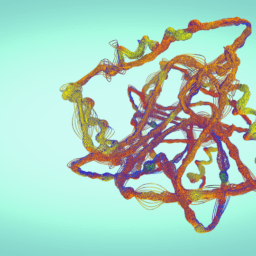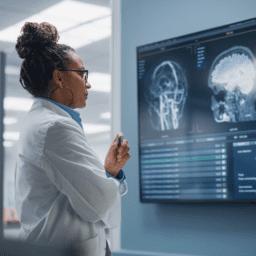Happy end of the month! We've rounded up research, information, and stories that made the headlines in June. Grab a cup of joe or tea, find a comfortable chair, and dig in. And, if we missed something important, please let us know in the comments.
Parkinson's Articles & Podcasts
- Poor circadian rhythms have been linked to developing Parkinson’s - A study from the University of California at San Francisco, recently published in JAMA Neurology, has found that disrupted circadian rhythms may indicate neurodegeneration already affecting the brain in younger men. Irregularity of circadian rhythms has also been found to cause an increased likelihood of developing Parkinson’s later in life.
- An overabundance of opportunistic pathogens are found in the gut of people with Parkinson’s – Researchers from the University of Alabama at Birmingham are exploring new evidence of the connection between Parkinson’s and the gut microbiome to see whether these pathogens are growing because Parkinson’s has weakened the gut lining or if they are Braak’s pathogens that are actually initiating Parkinson’s.
- A sedentary lifestyle has been linked to decreased attention span in people with Parkinson’s, offering new evidence as to the importance of exercise.
- Oleh Hornykiewicz recently died – The researcher who discovered that dopamine deficiencies are a root cause of Parkinson’s symptoms, and who developed the use of levodopa as a treatment, died in late May at age 93.
- COVID-19 may affect the expected growth of Parkinson’s and its socioeconomic impacts over the next several years.
- The University of Buffalo has received a grant to find a way to diagnose Parkinson’s before symptoms are visible.
- Even tiny amounts of non-Lewy body a-synuclein can cause Parkinson’s – In primate studies, researchers at the University of Bordeaux unexpectedly found that even minimal amounts of non-Lewy body a-synuclein led to serious neurodegeneration. These findings may affect how non-human studies on Parkinson’s are performed and may affect how antibody therapies are developed in the future.
- Exposure to diesel exhaust is linked to increased risk of Parkinson’s – In a study from the University of California at Los Angeles, recently published in Toxicological Sciences, researchers have found that air pollution from diesel exhaust may increase the buildup of a-synuclein in zebrafish and may contribute to Parkinson’s.
- GeriPal Podcast - Dr. Benzi Kluger discusses palliative care for people with Parkinson’s on the GeriPal podcast.
- Bill Rasmussen, the founder of ESPN, discusses his Parkinson’s on the podcast “When Life Gives You Parkinson’s”
- Ending PD’s webinar series features several of the most important voices in the Parkinson’s community, including Davis Phinney.
Parkinson's Therapies & Medications
- Kynmobi, a sublingual film manufactured by Sunovion, was recently FDA approved to treat OFF episodes for people with Parkinson’s.
- Advanced MRI scans may improve treatment of tremor and Parkinson’s – A new study from UT Southwestern, recently published in Brain, suggests that by focusing on smaller and more specific brain regions, MRIs can treat tremors and Parkinson’s non-surgically and with fewer negative side effects.
- Medical marijuana has mixed results for Parkinson’s symptoms – While some studies have found that marijuana use in people with Parkinson’s can help with symptoms of anxiety, muscle and joint pain, and insomnia, other studies have found that it can exacerbate other symptoms like balance, low blood pressure, hallucinations, paranoia, and cognition.
- A brain cell transplant has successfully stabilized the Parkinson’s progression in a clinical patient – This novel surgery, which involves implanting new cells into the brain of a person with Parkinson’s in hopes of increasing dopamine and forming synaptic connections with existing neurons in order to improve motor function, has been somewhat successful in its pilot patient. (This was in May, but it was new to us in June.)
- A miniature, wireless brain implant used to stimulate neurons may be the future of Deep Brain Stimulation (DBS) for people with Parkinson’s – Recently published in Neuron, this study shows the efficacy of a new type of brain implant (about the size of a grain of rice) that eliminates necessary battery recharges and potential infections sometimes associated with DBS implants, therefore offering a potential new technology to help address Parkinson’s symptoms.
Parkinson's Living Well Stories
- Dance for PD® is continuing to share dance classes online.
- Music brings a mother and her daughter together and works as emotional and physical therapy for her Parkinson’s.
- Cycling for therapy and charity: adapting to COVID-19 while still meeting Parkinson’s goals – A woman with YOPD is setting out to bike over 137 kilometers (including climbing 3700 vertical meters) along with her team across Britain to raise money for Parkinson’s organizations. While the ride was originally supposed to take place in the Alps, her adaptation to the current pandemic means that she is not only staying active but still meeting her goals despite the circumstances.
- A Los Angeles woman is making masks to fight COVID-19 and fundraise for Parkinson’s.
- Discover tips for living well with Parkinson’s during the pandemic from Penn Medicine.
- Find out how Alan Alda, who played Hawkeye on M*A*S*H, lives well with Parkinson’s.
- A 97-year-old woman with Parkinson’s raised thousands of pounds for charity and completed her walking challenge while under quarantine.
- This Massachusetts man is living well with Parkinson’s by using golf as a therapy and as a fundraiser.


















